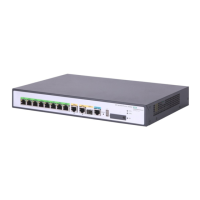541
IPv6 uRPF commands
In this chapter, "MSR1000" refers to MSR1002-4. "MSR2000" refers to MSR2003, MSR2004-24,
MSR2004-48. "MSR3000" collectively refers to MSR3012, MSR3024, MSR3044, MSR3064.
"MSR4000" collectively refers to MSR4060 and MSR4080.
display ipv6 urpf
Use display ipv6 urpf to display IPv6 uRPF configuration.
Syntax
MSR1000/MSR2000/MSR3000:
display ipv6 urpf [ interface interface-type interface-number ]
MSR4000:
display ipv6 urpf [ interface interface-type interface-number ] [ slot slot-number ]
Views
Any view
Predefined user roles
network-admin
network-operator
Parameters
interface interface-type interface-number: Specifies an interface by its type and number.
slot slot-number: Specifies a card by slot number. (MSR4000)
Usage guidelines
To display IPv6 uRPF configuration on an interface, check whether the interface is a global interface:
• If it is a global interface, specify the card where the interface resides. If you do not specify the
option, the command displays IPv6 uRPF configuration for the MPU. A global interface has a
one-dimensional number, such as VLAN-interface 10.
• If it is not a global interface, you do not need to specify the card for the command to display
interface IPv6 uRPF configuration. A non-global interface has a multiple-dimensional number, such
as GigabitEthernet 2/1/1.
Examples
# Display IPv6 uRPF configuration for the card in slot 3. (MSR4000)
<Sysname> display ipv6 urpf interface gigabitethernet 2/1/1 slot 3
IPv6 uRPF configuration information of interface GigabitEthernet2/1/1:
Check type: strict
Allow default route
# Display IPv6 uRPF configuration on interface GigabitEthernet 2/1/1.
(MSR1000/MSR2000/MSR3000)
<Sysname> display ipv6 urpf interface gigabitethernet 2/1/1

